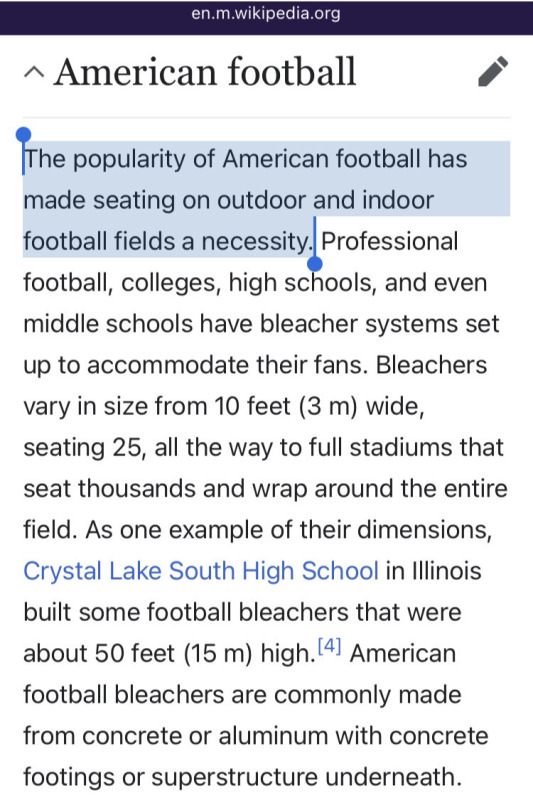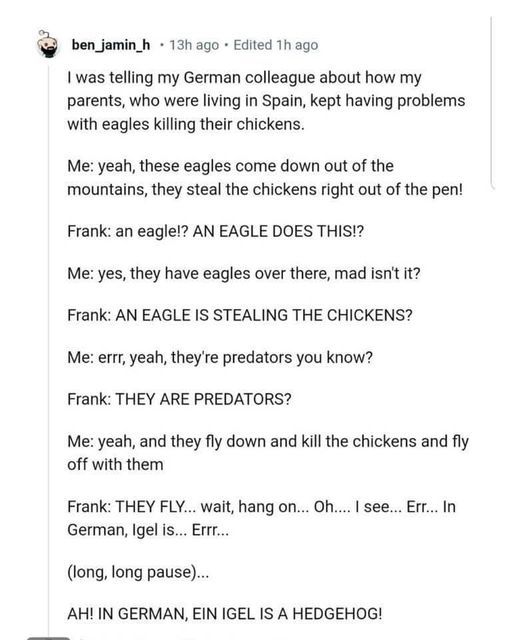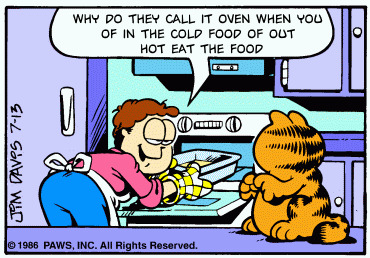Text
youtube
0 notes
Text
Get somebody from the Deep South to say
Jewlery
Brewery
Rural
Bureau
Burry
Terrible
Immature
Dirt
Hurt
Road
Aaron
Burnt
Horror
Scared
And you're likely to hear
Jrr-y
Brr-wery
Rrrl
Brr-oh
Brr-y
Trr-ible
Imma-toor
Dut
Hut
Ro-ed
Rrn
Bunt
Horr
Skerrd
#I LOVR HEARING IT TOO#i just tried to say 'brewery' and it came out almost 1 syllable HFKXMAKCKK#linguistics#dialect#deep south#my speech#linguistics memes
4 notes
·
View notes
Text
We ask your questions so you don’t have to! Submit your questions to have them posted anonymously as polls.
836 notes
·
View notes
Text
36K notes
·
View notes
Video
Owner asks dogs to hide because customer is scared of dogs
(via)
210K notes
·
View notes
Text
237 notes
·
View notes
Text

Doug's cousin, the one from London, runs a Bumble love cult.
Schwa [Explained]
Transcript Under the Cut
[Megan, Cueball, and Ponytail stand in front of a restaurant table.]
Megan: What's up? Was doug gonna come? Doug loves brunch.
Ponytail: Nuh Uh, Doug's stuck 'cause of a tunnel obstruction. A tunnel dropped a bunch of onions.
Megan: Ugh.
Caption: The schwa is the most common vowel sound in English. In fact, if you stick to the right conversation topics, you can avoid learning any other ones.
3K notes
·
View notes
Text
youtube
I want to speak Tagalog with my lola one day. I will probably make a new blog for that journey but heres a nice blog I found about it!
9 notes
·
View notes
Text
it's easy to get people to understand that british, american, and australian english all have different pronunciations and vocabulary. they can even understand that within these larger groups, smaller regional differences are common.
it's a bit harder to get them to understand that there's not one "correct" way to speak a language, and that grammar can also change across dialect. english has a couple different standardized forms meant to make communication and education easier, but everyone has their own variation that strays from the standards. it's natural for language to change over time and EVERYONE contributes to this whether they're aware of it or not.
and then, after you explain all this. you have the impossible task of repeating the exact same explanation over again while including mention of AAVE and english pidgins/creoles. because racism legitimately gives people brain damage.

54 notes
·
View notes
Text
Me and my mom were playing the 25 Words or Less card game last night, which is a great exercise in many language things, including vocab precision and communication.
She passed a few words on a card and time was running out on the word she was stuck on so she managed to give the clue for "opposite of nucleus". I had no idea what that was supposed to mean, and since she was low on words to use and had to conserve seconds, she had nothing else to say. She explained that she didnt know what to say for the word bc she forgot the word 'fahrenheit'. The word was 'celcius'.
Shit had me crying laughing.
4 notes
·
View notes
Text
the thing they dont tell you about working with little kids is it wrecks your vocabulary. you hear a kid phrase something bizarrely in a way only a 5 year old can and now any time you lose shit youre like "it dissed appear"
77K notes
·
View notes
Text
Etymological doublets
host and guest both derive from the same Indo-European root *ghosti- ‘stranger, guest, host’, one through Latin and one through Germanic.

This is an example of a doublet—a set of words in a language that have the same etymological root.
Usually this happens when the same word enters a language through different paths. For example, frail and fragile are a doublet that came to English through Old French vs. directly from Latin, respectively.
The same word can also be borrowed at different points in history. For example, street and strata were both borrowed from Latin strāta ‘laid down, spread out, paved’, but street was borrowed before the Anglo-Saxons had even come to England, while strata was borrowed during the Renaissance.
Here are a bunch of doublets in English!
131 notes
·
View notes
Text
The way this is worded reminds me that at one point every major sport in the world was just an idea a few ppl had and only few ppl played.

Its so crazy thinking thinking abt how at one point American football was called "gridiron football", which evolved from "soccer", whose namesake evolved from the shortening of "association football", which were both sports played by exclusive teams not yet nationalized in an entire industry of national leagues
It gave me an epiphany to read the reason why bleachers are called such, reminding me of the extensive history of how many U.S. cities and educational institutions incorporate sporting leagues, particularly of football, basketball, and soccer, into their programs and infrastructure to such extent that elaborate bleacher designs are necessary to accomodate thousands of fans of once low-key sports. Even municipal land is designated for sporting events that are so popular that bleachers are a must for the infrastructure design and entire industries are dedicated to catering to demands of "football" teams and other sports leagues.
I love how much history you can learn in the etymology of a word.
2 notes
·
View notes


